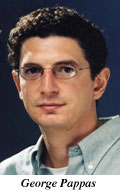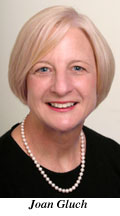
|
Honors & Other Things
Penn Prize for Excellence in Teaching by Graduate Students
At a reception at the Graduate Student Center, on April 29, President Judith Rodin presented certificates and checks to the ten awardees of this year's "Penn Prize for Excellence in Teaching by Graduate Students." She established and has funded the awards since 2000. At the ceremony, Deputy Provost Peter Conn congratulated the students and noted that they represent a much larger pool of graduate students who contribute greatly to the campus through their teaching and mentoring of undergraduates. Dr. Janice Madden, chair of the selection committee (which included past winners, faculty from across Penn, and undergraduates) read passages from the more than 220 nominations submitted. This year's awardees are: Marissa Greenberg English
Dr. George Pappas, assistant professor of electrical and systems engineering, has been named as one of the nation's most promising young scientists and engineers by President George W. Bush with a 2002 Presidential Early Career Award for Scientists and Engineers (PECASE). Dr. Pappas is one of 20 National Science Foundation (NSF)-supported researchers to be recognized at the White House. In total, 57 researchers sponsored by NSF and eight other federal departments and agencies were honored. Dr. Pappas was recognized for his work in the understanding of hybrid systems‹complex, information systems embedded inside physical systems such as those found in avionics, automotive electronics, robotics or medical devices. "Hybrid systems arise naturally when sensors and actuators, such as those physically controlling a robot, are supervised by software logic which focuses on higher level reasoning," said Dr. Pappas. "Inexpensive processors and sensors are becoming almost ubiquitous. So the application of hybrid system theory is not only interesting from an engineering perspective, but also important because of its presence in everyday life and relevance to our high-tech economy." Dr. Pappas received a $375,000 CAREER grant for the study of hierarchical abstractions of hybrid systems. This research will enable the integration of low-level, detailed physical models, used for controlling aircraft or robot motion, with high-level but simple models, used for multi-aircraft or multi-robot coordination. The grant also allows him to focus on creating new hybrid system courses for graduate and undergraduate students, allowing students to learn embedded and hybrid system concepts at Penn's GRASP Laboratory. Academy of Arts and Sciences: Three Fellows The American Academy of Arts and Sciences has elected 178 new Fellows this year including two Penn professors and one trustee. Dr. Robert James Sharer, curator, American Section, and the Sally & Alvin Shoemaker Professor of Anthropology, and Dr. Rogers M. Smith, the Christopher H. Browne Distinguished Professor of Political Science and the Honorable Leonore C. Annenberg, Trustee Emeritus, and President and Chairman of the Annenberg Foundation have recently been elected to the Academy. "These new members have made extraordinary contributions to their fields and disciplines through their commitment to the advancement of scholarly and creative work in every field and profession," said Academy President Patricia Meyer Spacks. Founded in 1780 by scholar patriots "to cultivate every art and science which may tend to advance the interest, honor, dignity, and happiness of a free, independent, and virtuous people." Sabloff Keeper of American Section In honor of Penn Museum Director, Dr. Jeremy A. Sabloff, who steps down at the end of June after 10 years as director, the Museum's Board of Overseers have contributed to endow The Jeremy A. Sabloff Keeper of the American Section. It has been endowed for $1.2 million. American Philosophical Society A. Bruce Mainwaring, chairman emeritus of the Museum's Board of Overseers (1991-1995), has been elected to the American Philosophical Society. The honorary society, founded in 1743, is unusual among learned societies because its membership is comprised of top scholars from a wide variety of academic disciplines. Touching the Mekong, a book providing a visual exploration of comtemporary life in southeast Asia, through 150 photographs by Andrea Baldeck (Med. '79), book design by Veronica Miller, published by the Penn Museum, won an honorable mention in the American Association of Museums' Museum Publications Design Competition.
Dr. Joan Gluch, Penn Dental's Director of Community Health, has been recognized for her leadership in community outreach as one of ten finalists for theThomas Ehrlich Faculty Award for Service Learning, named in honor of a former Penn Provost. "Joan has made an important intellectual contribution to the field, transforming clinical and field work and mandatory community service into a high quality, integrated, four-year program that improves the teaching of core dentistry skills while making a genuine, positive impact upon Penn's West Philadelphia community," says Dr. Ira Harkavy. "Moreover, she has been instrumental in building Penn Dental's community service capacity."
Kelly George, an SAS doctoral student in organic chemistry, is among five women to be honored for their achievements and promising scientific research as part of the L'Oreal USA for Women in Science Fellowship Programme. She will be awarded an education and research grant of $20,000 during a reception at the New York Academy of Sciences. Her research focuses on the synthesis of natural products from plants and fungi, recreating biologically active and medicinally significant in the laboratory. Her goal is to work as a synthetic organic chemist in the private sector where she can develop new pharmaceuticals. "Kelly is an outstanding individual, capable of chemistry at a very high level, but it is her more intangible qualities that really set her apart," said Dr. Gary Molander, her advisor and a chemistry professor. "In her time here she has created study groups for women in chemistry and an outreach program to bring chemistry to local schools. She a natural leader who really knows how to bring people together."
|
|


